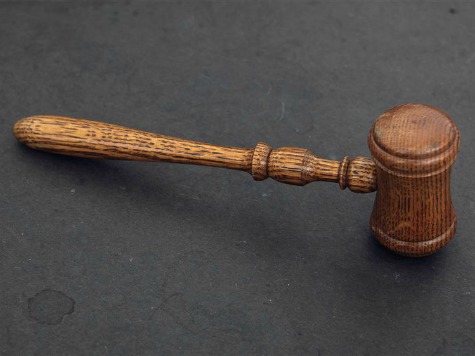Kansas and Arizona scored a big victory on ballot box integrity laws, one that the losing side is already appealing.
In 2013, Breitbart News reported about the outcome of Arizona v. Inter Tribal Council at the U.S. Supreme Court, where the court held seven to two that states’ laws requiring proof of citizenship are generally preempted by federal law.
But in his opinion for the court, Justice Antonin Scalia noted that federal law allowed states to request that the Election Assistance Commission (EAC)–a federal agency created in 2002–include citizenship documentation items in any state’s customized version of the “Federal Form” designed by the EAC.
The two other conservative justices, Clarence Thomas and Samuel Alito, dissented. Alito argued that the federal law allowed states to add the citizen-proof requirement, and Thomas added that if the federal law did not, it would unconstitutionally infringe upon state sovereignty.
Even though the majority rejected those positions, Scalia noted that Louisiana had received such permission years ago; therefore, there was no good reason for denying it to Arizona or other states. He added that any state requesting a citizenship-proof requirement could sue if its request was denied.
Breitbart News then reported that elected officials were formulating a battle plan to follow Scalia’s road map. Kansas and Arizona made requests, which were not granted. They then sued.
Now they have won in federal district court in Wichita, Kansas. In a 28-page opinion, U.S. District Judge Eric Melgren ordered the EAC to grant the requests Kansas and Arizona made months ago.
“This is a huge victory for the states of Kansas and Arizona. They have successfully protected our sovereign right to set and enforce the qualifications for registering to vote,” Kansas Secretary of State Kris Kobach–a rising conservative star in the Republican Party–said in a statement. Kobach is the lead plaintiff in the case, joined by his state of Kansas, the state of Arizona, and Arizona Secretary of State Ken Bennett.
“There were over 200 people who swore on jury commissioner forms that they were not citizens who were found to have registered to vote,” Arizona Attorney General Tom Horne explained to another outlet. Noting that only ten percent of voters receive a jury summons, Horne reasoned that this means a bare minimum of 2,000 fraudulent registrations had occurred, and he noted that statewide races had been lost by fewer votes than that.
The district court held a six-day trial considering evidence and testimony, then ruled in favor of the states. “So voter fraud is a significant problem and this helps us ensure that only American citizens, and not illegal aliens, will vote,” summarized Horne.
Arizona’s law is typical of the flexibility voters have to fulfill this requirement. “You can write down your driver’s license number or a non-operator’s identification number the motor vehicles division will give you, or, if you’re a naturalized citizen, your naturalization number, or a passport, or a birth certificate,” Horne concluded.
“Judge Melgren’s decision is very carefully researched and well-reasoned,” Kobach, who is also an accomplished law professor, told the media. “This is going to be a difficult decision for them to overturn on appeal.”
Many national Democratic leaders contend that voter fraud is a non-issue, and that those who claim it impacts elections are seeking to suppress votes that tend to be cast for Democrats. President Barack Obama and U.S. Attorney General Eric Holder are committed opponents of citizenship-proof laws. Yet a recent video from Florida shows non-citizens not only registered to vote–but actually casting votes.
Polling indicates conservatives and Republicans are on safe ground regarding this issue. A March 25, 2014, Rasmussen poll reveals that 78 percent of Americans favor requiring a person to show proof of citizenship before voting.
Without this ruling, Kansas and Arizona would have had to consider two voting options: one election system for federal congressional and presidential elections that would not require proof of citizenship and a separate voter roll for state and local elections. “Because of this victory there will be no need for a dual election system,” Kobach stated.
This case will now go to the U.S. Court of Appeals for the Tenth Circuit in Denver.
Ken Klukowski is senior legal analyst for Breitbart News and a fellow with the American Civil Rights Union. Follow him on Twitter @kenklukowski.

COMMENTS
Please let us know if you're having issues with commenting.